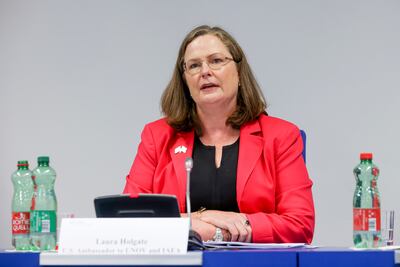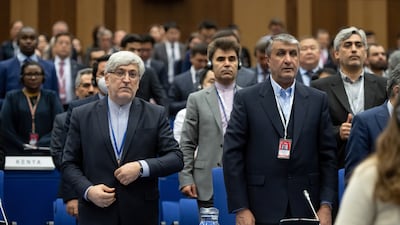Iran is holding up progress on a nuclear deal with world powers by “moving the goalposts” and introducing new challenges to the 18-month talks, a senior US diplomat has told The National.
Laura Holgate, the US ambassador to the UN’s nuclear watchdog, the International Atomic Energy Agency, said American negotiators were ready to reach a revived deal.
She spoke after a meeting of the IAEA’s board of governors in Vienna where a number of countries that have raised concerns about Iran’s nuclear programme, including Saudi Arabia, took up seats on the ruling board.
Iran, meanwhile, has said it is Washington that needs to show political will to close a new deal.
The 2015 Joint Comprehensive Plan of Action deal limited Iran’s nuclear activities in exchange for sanctions relief.
Under the presidency of Donald Trump, the US pulled out in 2018, citing security concerns, and reimposed sanctions. Iran responded by enriching uranium beyond levels permitted under the pact.
While talks continue on restoring the deal, the IAEA has been pressing Iran for answers over unexplained uranium found at three sites. It has raised doubts over whether Iran’s nuclear programme is as peaceful as it says.
Although western diplomats see the two issues as separate, Iran has indicated it wants the IAEA inquiry out of the way before it will sign the restored JCPOA deal.
“We have been ready to restore the JCPOA for months now," Ms Holgate told The National in Vienna.
"Iran is the one that continues to move the goalposts, continues to introduce new challenges, continues to make unacceptable linkages.
“So, the Iranians are the ones that have to make the steps to come back to the JCPOA.”

Iran has refused to negotiate directly with the US since talks on a revived deal began in April 2021. European diplomats are acting as go-betweens.
Nasser Kanani, a spokesman for Iran’s Foreign Ministry, said on Monday that indirect talks were continuing and that there was still a chance to restore the deal if “the other side, particularly the US government, shows political will”.
“Efforts are under way with the European coordinator and other mediators, including the foreign ministries of neighbouring countries, to exchange messages to reach an agreement,” he told a press conference.
Ms Holgate, who was appointed to the IAEA role by President Joe Biden last year after holding the same position under Barack Obama, said she hoped others, including Gulf countries, might be able to persuade Tehran to budge.
“I think we have to look to others to move Iran towards a more constructive posture, vis-a-vis the return to the JCPOA, as well as the separate issue of the unanswered safeguards questions that are still open here with the IAEA,” she said.
“The Gulf countries have their own relations and engagement with Iran that that we don't have at the moment.
“So, we're happy to encourage and to see others help Iran understand the benefits that can come to them from resolving the open questions with the IAEA and returning to effective implementation of the JCPOA.”
Saudi Arabia and Qatar took up seats on Monday on the IAEA’s 35-member board. The agency faces the twin headaches of resolving the dispute with Iran and managing the precarious nuclear situation in Ukraine, following Russia's invasion in February.
Saudi Energy Minister Prince Abdulaziz bin Salman called Iran’s nuclear activities a threat to peace and stability at the IAEA conference last week, where the new board members were elected.

European countries joining the board also expressed concern.
Bulgarian diplomat Tsanko Bachiyski told colleagues that Tehran should “refrain from any further escalatory steps”, after breaching the limits under the 2015 deal.
Iran has enriched uranium to 60 per cent — a level that western diplomats say has no plausible civilian use. The JCPOA deal set a 3.67 per cent maximum.
Tehran has also exceeded limits on uranium stockpiles.
The EU said it was “increasingly concerned” by Iranian activities that may bring irreversible gains in nuclear know-how, even if the deal is eventually restored.
Denmark, also elected to the board, expressed “deep concern” about Iran’s activities.
Costa Rica, another new board member, urged Tehran to co-operate fully with the IAEA.
Iran’s uranium enrichment “deepens doubts” that its nuclear programme is peaceful, said Christian Guillermet Fernandez, Costa Rica’s delegate in Vienna.
Rafael Grossi, the IAEA’s director general, told the board last month that the agency could not be sure Iran’s nuclear programme was peaceful until it received satisfactory explanations for the uranium traces at three sites.
Even then, the IAEA’s monitoring has been hampered by Iran’s actions and the agency will need to “address the gap in its knowledge” if the deal is revived, Mr Grossi said.
A deal appeared close until talks broke off in March, after Russia’s invasion of Ukraine. Moscow's presence at the negotiating table in Vienna while at war with its neighbour complicated discussions. The EU tabled a new text in July.
Britain, Germany, France and China are also parties to the deal.


